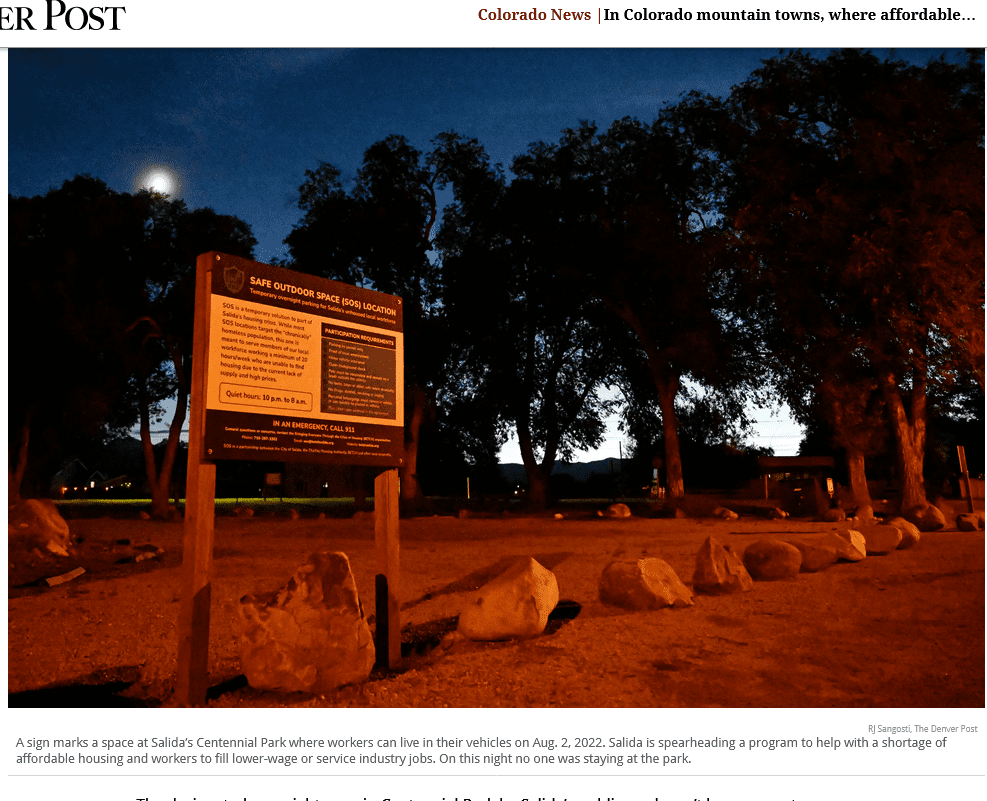This interesting article by Bruce Finley of the Denver Post may be pay walled so I will try to hit the highlights; it focused on Colorado mountain towns, but the problem is certainly wider.
Across mountainous western Colorado, cars as cocoons for sleep and sanity serve as last-resort shelters helping hundreds who provide services stay around. Yet “parking is at a premium,” said Margaret Bowes, director of the Colorado Association of Ski Towns, welcoming the creation of new designated overnight lots.
“It’s just a safe place to park where people aren’t going to be bothered by police,” Bowes said. “These are the people keeping our communities running. We need them here.”
Not that vehicle living is easy for workers who, after completing shifts cleaning, cooking and shop-keeping, can face disapproving glances and have to slip strategically into toilets and showers.
Local business manager Scott Link, 45, recalled: “the things that come with this — the depression, the paranoia” — after a three-year stint “trying to keep a really low profile” while living out of a white camper truck with his two pit bulls.
“I was losing my mind. I was close to killing myself,” said Link, who moved back to his native southern California for a change of venue after his grandmother died and then found housing with his girlfriend in Buena Vista, 24 miles north of Salida (pop. 5,752).
The Colorado Sports Recycler shop he manages has become a popular hub where he and colleagues inject humor into hard times by creating bumper stickers.
“One less Sprinter” stickers, poking fun at the high-end Mercedes camper vans roving around the West, quickly sold out. “Now, it’s like even living out of your car is gentrified,” explained Brendan Gibbs, 37, sitting with Link in the shop one recent evening before heading back to his latest public land parking spot. He earns nearly $30 an hour building towering houses he reckoned he could never afford.
Next bumper sticker in the works: “Salida: where the locals live in motels and tourists stay in houses.”
The squeeze has intensified as the internet enables expanding commercial use of housing for short-term rentals and a COVID-19-era influx of well-to-do people fleeing dense-packed cities drives up prices.
**************
The designated overnight zone in Centennial Park by Salida’s public pool won’t be a magnet because only workers sponsored by employers can receive window-sticker permits, Nelson said. “This is designed for the workforce, not just whomever is rolling into town.” Similarly, the campers are available only for workers.
Mayor Dan Shore supported these innovations, navigating neighborhood criticism by emphasizing economic imbalances with houses costing more than ten times the annual median income of around $60,000. “These are workers who serve you and your families.”
But longtime resident and logger Kirby Perschbacher, 70, demands better, urging town leaders to focus on broader economic problems rather than settling for a temporary fix. Perschbacher sees newcomers flocking from cities and transforming Salida as the problem.
“They don’t want to work. They want somebody to serve them. They are creating a servant class,” Perschbacher said. “Our workers should be paid enough so that they don’t have to live out of their cars. It might be better not to put a band-aid on it. This is a pretend fix.”
*************
On Wednesday afternoon, a man who grew up in Salida sat in his brother’s parked pickup truck with the door open, a blue cruiser bicycle parked beside it, along banks of the Arkansas River. He was savoring shade given by a towering cottonwood tree near where a sign said “no overnight camping.”
Their parents bought a house in Salida for $25,000 in 1975. The family sold it, and the man said he and his brother would be hard-pressed to re-purchase it for under $700,000. He’s worked as a sheriff’s deputy and for a state government agency in the past and now, at age 52, had worked most recently installing carpet.
“It is still my town,” he said, asking that his name not be published for fear this would bring trouble from other residents. He knew about the new SOS parking lot option. “I can’t afford a permit,” he said.
Salida code enforcers pulled up just then in a white van marked “community services.” Two officers got out and Sean Lombard, Taser stun gun on his belt, approached.
“You can’t stay here overnight. Stay out of the city if you are camping,” Lombard said.
*******************
Kort also owns a campground. The fees for camping range from $22 a night to $56 a night at a KOA facility west of Salida. On BLM and U.S. Forest Service land, rangers increasingly enforce 14-day limits on parking and camping in one place, struggling to manage human impact on delicate natural terrain.
******************
There appear to be many dispersed camping spots around Salida that are not necessarily “delicate” terrain. Also, people could drive to different ones every night or every 13 days. It would be interesting to hear from federal land managers with their concerns and solutions.

I know 4 people that moved from Flagstaff to Salida 3-5 years ago to escape what has become of Flagstaff and try to find that place they used to love. The small town vibe of Flagstaff degraded little by little over the past 40 years from the perpetual influx of second home owners from Phoenix, tourists, the ever-expanding number of college students at NAU, and weekend warriors camping in massive groups and driving wherever a side-by-side will take them while shooting AR-15s like it’s little Bagdad. My friends spoke of Salida as though it was the promise land…then Covid and remote work happened.
“It would be interesting to hear from federal land managers with their concerns and solutions.”
Here’s what the Bighorn National Forest is doing about “careless dispersed camping squatters dropping off their RVs in the forest for an entire season with the intention of using them as “summer homes.””
https://www.rvtravel.com/bighorn-national-forest-asks-community-addressing-dispersed-camping-squatters-1069b/